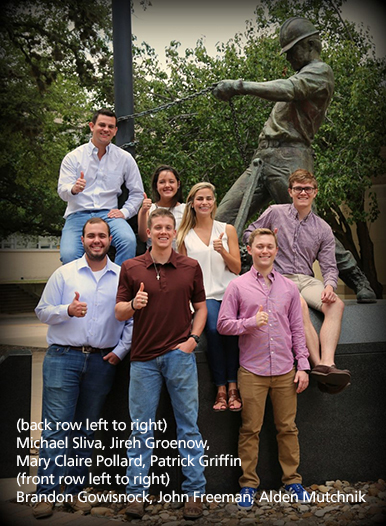
Seven petroleum engineering students at Texas A&M University will claim more than just a bachelor’s degree when they walk across the stage in May. John Freeman, Brandon Gowisnock, Patrick Griffin, Jireh Groenow, Alden Mutchnik, Mary Claire Pollard and Michael Sliva have all earned a Petroleum Ventures Program (PVP) certificate. They are the first petroleum engineers to do so, and it is an impressive achievement.
The PVP is an interdisciplinary partnership between the Harold Vance Department of Petroleum Engineering and the Mays Business School. It was created a year ago when Anthony Bahr ’91 and Jay Graham ’92, founders of WildHorse Resources in Houston, donated $12 million for the purpose of teaching finance skills to petroleum engineering students and petroleum engineering skills to finance students. Students who go through the program receive the certificate.
“I’m thrilled to welcome the inaugural class of business and engineering students into the Petroleum Ventures Program, and excited these students have made a significant commitment to their future careers in the energy business,” said Bahr.
All petroleum students gain some knowledge of petroleum economics and finance in the required course PETE 353. The certificate program is geared toward students who have the drive to start their own companies or aim for upper management positions, so more financial knowledge is needed. Petroleum participants attend 16 hours of classes, some required and some elective, in addition to the classes required by their major.
“While not impossible, it would be unusual for a student to earn both his bachelor’s in petroleum and this certificate in four years,” said Cathy Sliva, associate professor of practice and the petroleum director of PVP. “The petroleum curriculum, even without a certificate, is rigorous, so it would be difficult.”
Students adding one semester to their four-year study can earn the certificate, but this leads to heavily-loaded semesters during their junior and senior years. Five-year students are able to mete out the hours into more manageable loads. Even though the work is hard, students found it valuable to go above and beyond.
“I saw the opportunity to take advanced courses in finance, to work with the finance students who will one day help fund and advise any business I’m a part of,” said Mutchnik.
Students also found it valuable to speak up. Based on petroleum student feedback, the PVP identified a larger choice of elective finance courses that fit the program and added flexibility.
“The students’ dedication and enthusiasm for all things PVP is contagious,” said Sliva. “That’s part of the popularity of the program. We’re learning as we go. Not only are we making improvements to our processes with feedback from students, but we’re also working closely with our advisory board specific to PVP.”
The PVP advisory board is comprised of 25 successful individuals, which includes petroleum engineers, business and finance specialists, and oil and gas lawyers. The members offer many different perspectives and are eager to provide input on what they would like to see in students coming out of the program.
In one of its recent meetings the board introduced the idea of a petroleum technical entrepreneurship course. Sliva and another professor of engineering practice are currently creating it, and it will launch this fall as a technical elective.
Companies outside the board are also taking notice of the program. According to Sliva, there are bi-monthly meetings where students listen to presentations from industry, and she has no trouble lining up speakers for these events.
“This (program) is going to become the new normal,” said Sliva. “The interest increases as the students hear about it and the interest increases as industry hears about it. I’ve heard people within the industry say, ‘I want to hire a PVP graduate.’”
The program is also gaining the attention of other departments and colleges at Texas A&M. More than 40 students applied to the PVP this past spring, and Sliva hopes these numbers will encourage the development of similar programs.
“I suspect we’ll have certificate students graduating every December and May from now on,” said Sliva. “As our students go out there and show what they’re capable of, that will help promote the program.”
Now that seven petroleum engineering graduates with PVP certificates will walk the stage to make their mark on the world, anticipation is high for their success.
“This program has allowed me to make connections with other students and industry professionals that I hope will last throughout my career,” said Pollard.
Pictured: (back row left to right) Michael Sliva, Jireh Groenow, Mary Claire Pollard, Patrick Griffin (front row left to right) Brandon Gowisnock, John Freeman, Alden Mutchnick.